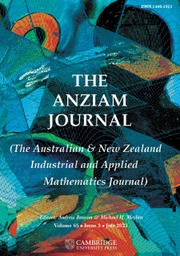Crossref Citations
This article has been cited by the following publications. This list is generated based on data provided by
Crossref.
Lohmann, Adolf W.
1995.
A fake zoom lens for fractional Fourier experiments.
Optics Communications,
Vol. 115,
Issue. 5-6,
p.
437.
Mustard, David
1996.
The fractional fourier transform and the wigner distribution.
The Journal of the Australian Mathematical Society. Series B. Applied Mathematics,
Vol. 38,
Issue. 2,
p.
209.
Folland, Gerald B.
and
Sitaram, Alladi
1997.
The uncertainty principle: A mathematical survey.
The Journal of Fourier Analysis and Applications,
Vol. 3,
Issue. 3,
p.
207.
Sheppard, C. J. R.
1998.
Free-space diffraction and the fractional fourier transform.
Journal of Modern Optics,
Vol. 45,
Issue. 10,
p.
2097.
Ozaktas, Haldun M.
Kutay, M. Alper
and
Mendlovic, David
1999.
Vol. 106,
Issue. ,
p.
239.
Sheppard, Colin J. R.
and
Larkin, Kieran G.
2000.
Focal shift, optical transfer function, and phase-space representations.
Journal of the Optical Society of America A,
Vol. 17,
Issue. 4,
p.
772.
Forbes, G. W.
and
Alonso, M. A.
2001.
Measures of spread for periodic distributions and the associated uncertainty relations.
American Journal of Physics,
Vol. 69,
Issue. 3,
p.
340.
Shinde, S.
and
Gadre, V.M.
2001.
An uncertainty principle for real signals in the fractional Fourier transform domain.
IEEE Transactions on Signal Processing,
Vol. 49,
Issue. 11,
p.
2545.
Zayed, A.I.
2002.
A class of fractional integral transforms: a generalization of the fractional Fourier transform.
IEEE Transactions on Signal Processing,
Vol. 50,
Issue. 3,
p.
619.
Savage, C.O.
and
Moran, B.
2007.
Waveform Selection for Maneuvering Targets Within an IMM Framework.
IEEE Transactions on Aerospace and Electronic Systems,
Vol. 43,
Issue. 3,
p.
1205.
Sharma, K.K.
and
Joshi, S.D.
2008.
Uncertainty Principle for Real Signals in the Linear Canonical Transform Domains.
IEEE Transactions on Signal Processing,
Vol. 56,
Issue. 7,
p.
2677.
Guanlei, Xu
Xiaotong, Wang
and
Xiaogang, Xu
2009.
The logarithmic, Heisenberg's and short-time uncertainty principles associated with fractional Fourier transform.
Signal Processing,
Vol. 89,
Issue. 3,
p.
339.
Juan Zhao
Ran Tao
Yan-Lei Li
and
Yue Wang
2009.
Uncertainty Principles for Linear Canonical Transform.
IEEE Transactions on Signal Processing,
Vol. 57,
Issue. 7,
p.
2856.
Guanlei, Xu
Xiaotong, Wang
and
Xiaogang, Xu
2009.
Generalized entropic uncertainty principle on fractional Fourier transform.
Signal Processing,
Vol. 89,
Issue. 12,
p.
2692.
Xu Guanlei
Wang Xiaotong
and
Xu Xiaogang
2010.
On Uncertainty Principle for the Linear Canonical Transform of Complex Signals.
IEEE Transactions on Signal Processing,
Vol. 58,
Issue. 9,
p.
4916.
Guan-Lei, Xu
Xiao-Tong, Wang
and
Xiao-Gang, Xu
2010.
Novel uncertainty relations associated with fractional Fourier transform.
Chinese Physics B,
Vol. 19,
Issue. 1,
p.
014203.
Shi, Jun
Liu, Xiaoping
and
Zhang, Naitong
2012.
On uncertainty principle for signal concentrations with fractional Fourier transform.
Signal Processing,
Vol. 92,
Issue. 12,
p.
2830.
Li, Xiumei
Bi, Guoan
and
Li, Shenghong
2012.
On uncertainty principle of the local polynomial Fourier transform.
EURASIP Journal on Advances in Signal Processing,
Vol. 2012,
Issue. 1,
Yang, Xiao-Jun
Baleanu, Dumitru
and
Tenreiro Machado, José António
2013.
Mathematical aspects of the Heisenberg uncertainty principle within local fractional Fourier analysis.
Boundary Value Problems,
Vol. 2013,
Issue. 1,
Kou, Kit Ian
Ou, Jian-Yu
and
Morais, Joao
2013.
On Uncertainty Principle for Quaternionic Linear Canonical Transform.
Abstract and Applied Analysis,
Vol. 2013,
Issue. ,
p.
1.

